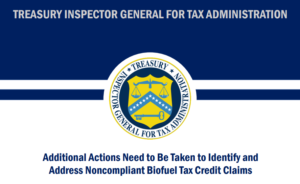The U.S. Treasury Department on Tuesday issued a proposed rule governing how biofuel makers can access a $1-per-gallon tax credit for low-carbon transportation fuels, including aviation fuel. The rule was…
Audit Finds Potential Fraud in Biofuels Tax Credit Program
Progressive Farmer’s Todd Neeley reported Thursday that “a new audit of biofuel tax credits called for the IRS to use more of its enforcement tools after $30.3 million in credits were improperly granted in 2022, according to an April 2024 report from the Treasury Inspector General for Tax Administration.”
“The IG said in its report it conducted an analysis of a sample of 124 taxpayers who claimed biofuel tax credits and found 42 taxpayers who did not provide approved registration numbers or certificates of biofuels,” Neeley reported. “The group of taxpayers claimed about $252.6 million in biofuel tax credits.”
The Iowa Capital Dispatch’s Ed Tibbetts wrote that, while the Treasury Inspector General for Tax Administration cautioned that “the sample in the audit should not be extrapolated to the entire program, (the IG) said ever since Congress enacted legislation creating biofuel tax credits in 2004, ‘the IRS has been susceptible to significant fraudulent schemes that have resulted in the payment of erroneous refunds.'”

Details of the Audit
Neeley reported that “of the 42 taxpayers identified, the Inspector General (IG) found 13 who received about $25.8 million in tax credits from the alternative fuel credits but didn’t provide registration numbers or biofuel certificates. The alternative fuel credit provides a 50-cent credit for each gallon of alternative fuel or gasoline gallon equivalents of a nonliquid alternative fuel sold for use in a motor vehicle or motorboat. Such fuels include liquefied petroleum gas, compressed or liquefied natural gas, compressed or liquefied gas derived from biomass.”
“The IG also found 29 taxpayers out of 75 sampled who claimed the $1-per-gallon biodiesel or renewable diesel mixture credit,” Neeley reported. “Those taxpayers received about $4.5 million in credits for which proper certificates were not provided, according to the report.”
“The IG said it found the IRS does not address ‘improper biofuel tax credit claims’ during filing because it ‘lacks legal authority’ to do so and can only address claims during examinations,” Neeley wrote.
Not The First Improper Claims for Biofuels Tax Credits
While the report highlights a number of improperly granted tax credits for biofuels in 2022, high profile cases of improperly claimed tax credits from the program have been seen before. For example, a case in 2023 involved Jacob O. Kingston of Washakie Renewable Energy, who the Salt Lake Tribune’s Nate Carlisle reported “stole $511 million from a government biofuel program.”
“Washakie promoted itself on television and in other advertisements as taking used cooking grease, cornstalks and other biological materials and turning them into biodiesel at its plant,” Carlisle reported. “In reality, according to evidence in the case, Washakie made little fuel. Instead, members of the polygamous Kingston family committed forgeries and frauds to collect a federal tax credit meant to stimulate biodiesel production. Washakie applied for more than $1 billion in credits and received about half that.”
In addition, Biodiesel Magazine reported at the end of 2020 that “a Colorado resident was sentenced to 15 months in prison on Oct. 27 for his role in a biodiesel tax credit fraud scheme. According to court documents and statements made in court, from 2010 to 2013, Calvin Glover and his coconspirators defrauded the United States of $7.2 million by filing false claims with the IRS for renewable fuel tax credits.”
Recommendations to Cut Down on Improper Claims
Neeley reported that “the Treasury IG made several recommendations to the IRS to ensure the biofuels tax credits claimed are valid. That includes the IRS developing a legislative proposal to give the agency the authority to ensure taxpayers claiming biofuels credits actually qualify.”
“The IG also recommended that the IRS ‘conduct examinations’ on the 42 taxpayers identified in the analysis to ‘ensure the validity of the credits claimed,'” Neeley reported. “Other recommendations include examining more tax forms involving biofuels credits and partnering with the U.S. Environmental Protection Agency to use the agency’s ‘expertise and data’ involving taxpayers who claim biofuels credits.”





